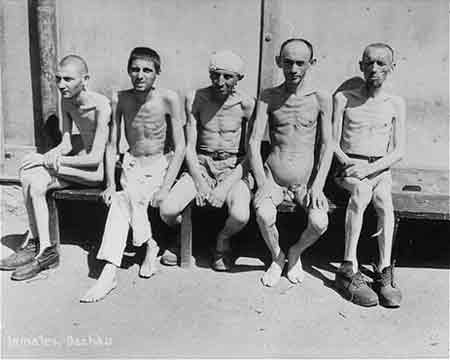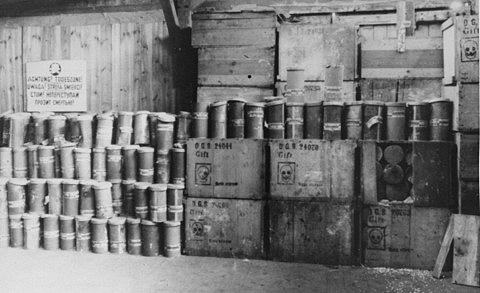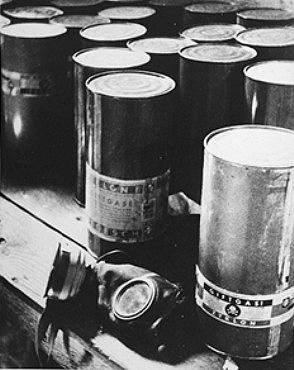The concentration camps were for slave labor. "Round the clock allied bombing made it impossible to maintain them. The idea that six million were gassed and cremated is a convenient way for the allies to cover up their parts in it.
No argument from me. Typhus and starvation, mostly due to 'round the clock bombing by the U.S. and the British. Not that there is any excuse for the camps. German civilians were starving too.
You and Cypress should stop emoting, and virtue signalling and start thinking.
None of this is virtue signaling. It's history. And part of the history comes from first-hand testimony of those who survived the camps.
"Lesław Dyrcz leaned over a pile of rubble and dirt, completely unaware that he was about to make a discovery that would shed light on one of history’s darkest moments. It was 1980, and the forestry student was working to help restore the original forest around what was once
Auschwitz-Birkenau, one of the Nazis’ most notorious death camps. Dyrcz was there to help mitigate the effects decades of air pollution had on the forest, attempting to let its original pine trees grow once more. But the student was about to change history.
As he dug, Dyrcz
discovered a leather briefcase buried in the ground. He opened it up and found a thermos. Inside the container were pages of handwritten paper. Though Dyrcz could not read the text—it was written in Greek—he had just discovered one of the most important pieces of testimony of the
Holocaust: eyewitness accounts of Nazi crimes, written by Marcel Nadjary, a Jewish man from Greece who had been enslaved with about 2,000 others and forced to help the Nazis as they operated their grimly efficient killing machines.
Nadjary had been one of the Sonderkommando—a group of men, most of them Jewish, tasked with taking the Nazis’ victims from the gas chambers and disposing of the bodies. At the peak of Auschwitz’s operations, up to 6,000 Jews a day were gassed by the Nazis. Then, the Sonderkommando’s unthinkable task began. Though historians had known about the Sonderkommando, the secrecy of their work and the fact that so many didn’t survive the Holocaust, made testimony like Nadjary’s even more precious.
Even at the height of the Holocaust, the work of the Sonderkommando was shrouded in mystery and performed under threat of death. Since the people brought to the gas chambers were all murdered, the Sonderkommando were the only witnesses who survived. And since they knew the Nazis’ secrets firsthand, their lives at Auschwitz were marked by fear and isolation.
The
duties of Sonderkommando varied, but all entailed helping the Nazis move along their extermination of Jews. Nazis did the actual killing, dropping Zyklon B pellets into gas chambers, but the Sonderkommando were forced to do nearly everything else. They helped maintain order among prisoners who were about to be killed, lying and telling them that they needed to take showers before rejoining their families. They removed the naked bodies from the gas chamber, picked them over for gold teeth and hidden valuables, and cut their hair off to sell to German companies to be used for cloth, ammunition packaging and other purposes. They sorted the clothing and personal effects they had left behind. They carried the bodies to the crematoria and stuffed them into the ovens. Then they ground the remaining bones and took the ashes to various dumping sites to
hide the evidence.
The Sonderkommandos’ work ultimately helped the Nazis, but was performed under constant threat of death and with an understanding that, as material witnesses to the Nazis’ crimes, they too would be murdered at some point. Many were even
forced to dispose of the bodies of their own loved ones.But the proximity of the Sonderkommando to the Nazis’ crimes also gave them special access to evidence of the mass murder and genocide committed at Auschwitz. In late 1944, as the war seemed close to an end, a group of Sonderkommando
revolted in a short-lived mutiny that ended with the explosion of one of the crematoria and the murder of most of the conspirators. Many members of the units felt the urgent need to spread the word about what they had witnessed.
“Survivors of Auschwitz have repeatedly reported that members of the Sonderkommando called out to them: ‘When you leave the camp, talk, write and scream so the world may learn what is happening here!’”
wrote Hermann Langbein, who was imprisoned at Auschwitz in 1942.
Another attempt to record the history of the killing operation at Auschwitz took place in 1944, when a group of Sonderkommando smuggled a camera onto their job site and photographed a group of naked women awaiting their turn in the gas chambers. They also took an accidental photo of some trees in the forest where the gas chambers were located and two photos of bodies being burned in the open, which had become a necessity due to overcrowded furnaces. The four photographs, which were smuggled out of the camp in a toothpaste tube and delivered to Polish Resistance fighters, are the only photos in existence that document what happened near the gas chambers at Auschwitz.
Those images—and the testimony of people like Nadjary, who recorded details of the gas chambers along with his desire to avenge his mother, father and sister, all of whom were murdered at Auschwitz—didn’t stop the killing. They couldn’t save the Sonderkommando either: only about 100
survived. But these documents remain as important proof of what happened during the Holocaust, as well as evidence of the immense physical and psychological toll the Nazis exacted on the men they forced to help carry out their crimes.
“I am not sad that I will die,” Nadjari
wrote in the buried letters, “but I am sad that I won’t be able to take revenge like I would like to.” Nadjari never got a chance to exact his revenge—but by documenting his forced work on behalf of the Nazis’ Final Solution, he provided critical evidence of the magnitude of the Nazis’ murders, forever shaping the understanding of this period of history.
https://www.history.com/news/the-jewish-men-forced-to-help-run-auschwitz




